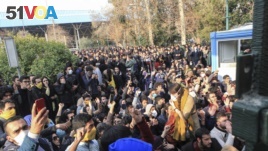01 May, 2018
Iran's government has ordered internet service providers to block the messaging service Telegram.
Iranian state television said on Monday that the country's judiciary approved the order in interests of national security. Iran has an estimated 40 million Telegram users – about half its population.
The Fars news agency said the blocking of Telegram should include a way to prevent users from accessing it with a virtual private network, or VPN, or any other software program. A VPN uses software to link to private computer networks outside the country to make it appear that the device or computer is based overseas.
Iran had been considering banning the service since January, when critics of the government's economic policies demonstrated in many cities. Some Iranian officials accused the protesters of using Telegram to organize and briefly blocked the app.

In this Saturday, Dec. 30, 2017 file photo taken by an individual not employed by the Associated Press and obtained by the AP outside Iran, university students attend a protest inside Tehran University while anti-riot Iranian police prevent them to
The official website of Iran's judiciary, Mizan, published details of the latest court order. It said the messaging service had been used to spread "propaganda against the establishment" and to organize "terrorist activities."
At least 25 people were killed and more than 5,000 arrested during the demonstrations. The protests were eventually contained by Iranian military forces.
Iran blocks social media services like Facebook and Twitter, and limits information on other websites. The government says it blocks information it considers offensive or criminal.
The order to block Telegram came nearly two weeks after Iranian President Hassan Rouhani banned government agencies from using the messaging service.
In a related development, thousands of people marched through Moscow on Monday to protest Russia's blocking of Telegram. Some demonstrators denounced Russian President Vladimir Putin and the government. Many threw paper airplanes into the air. Telegram uses an image of a paper airplane as its trademark.
Russian opposition leader Alexei Navalny attended the protest. "Nothing can be forbidden to a normal person," he told reporters. "I have my civic rights, and I don't care about all these bans. I do everything I want, everything I find necessary, and everything I'm given the right to by the constitution."
Russia began blocking Telegram two weeks ago after the company refused to obey an order to provide users' encrypted messages to the government's Federal Security Service (FSB).
Russian officials have said they need to read the messages to investigate the use of Telegram by violent extremist groups. But Telegram has repeatedly refused to surrender access to messages, arguing this would violate its users' privacy.
A group of 26 international human rights and internet freedom organizations have signed a petition protesting Russia's action. They say they see the restrictions as an attack by officials on internet freedom. They also note that the restrictions also affect other websites dealing with shopping, banking and travel.
I'm Bryan Lynn.
Bryan Lynn wrote this story for VOA Learning English. His story was based on information from VOANews, the Associated Press and Reuters. George Grow was the editor.
We want to hear from you. Write to us in the Comments section, and visit 51VOA.COM.
_____________________________________________________________
Words in This Story
access – v. to get near or gain use of something
network – n. system of computers connected together for the purpose of sharing information
offensive – adj. likely to make people angry or upset
trademark – n. the legal name of a company or product
forbidden – adj. not permitted
encrypted – adj. having electronic information changed into a secret system of letters, numbers or symbols to hide its meaning
shopping – n. the action of going to places where goods are sold